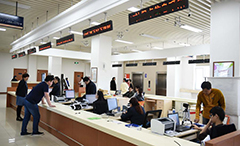China to set up evaluation system to improve business climate
2018-11-28
english.gov.cn
Premier Li Keqiang heard work reports on improving China’s business environment to align with advanced international standards at the State Council executive meeting on Nov 28. It was decided at the meeting that China will carry out evaluation of its business climate by measuring it against international standards.
The Chinese government places great importance on deepening the reform of government functions and enhancing the business environment. President Xi Jinping underlined the need to improve the investment and market environment, accelerate opening-up and foster a stable, fair, transparent and predictable business climate. Premier Li Keqiang said the business environment is like the soil nourishing corporate development and reflects market competitiveness. It is hence crucial to foster a world-class business environment that is market-driven, law-based and up to international standards.
The government’s relentless efforts in recent years to streamline administration, enhance compliance oversight and provide better services have brought notable improvements in China’s business climate. The World Bank’s recent report of Doing Business 2019 ranked China at 46, up 32 spots from 2017.
“With continued reform of government functions, our business environment has visibly improved in recent years, and its global ranking has continuously moved up,” Premier Li said. “As many as 18,000 new market entities are now registered on an average day, up from several thousand a few years back. This would not be possible without an enabling business climate.”
The meeting on Nov 28 stressed the importance of bettering the business environment for promoting high-quality development. Efforts will be made to better align with advanced international standards, tackle areas of major weakness and vigorously pursue reform and opening-up.
“To foster a more enabling business environment, the primary task is to widen market access, and secondly to properly exercise supervision and oversight,” Premier Li said. “The government should leave no regulatory gaps and conduct even-handed oversight, abolish any arbitrary practices in fee collection or inspection, avoid unwarranted interference in business operations and continuously narrow the gap with world-class business environments.”
“Based on the concerns expressed by market entities, we should apply international standards in the context of China’s marketplace to truly reflect the actual conditions on the ground,” he said.
The meeting agreed to set up a system for evaluating the business environment in China that is comparable internationally, aligned with World Bank standards and reflects Chinese features. The assessing criteria shall cover areas of immediate concern to market entities, such as ease of opening a business, construction licensing, access to electricity and credit, paying taxes, filing for bankruptcy, and the protection of intellectual property rights.
The evaluation will be carried out across the country in due course. Local authorities and departments will be encouraged to come up with more solid measures for bettering the business climate. The aim is to deliver tangible benefits to enterprises and maintain China’s status as a popular destination for investment from home and abroad.
“Countries around the world are working to upgrade their business environment, as this is crucial for attracting investment, boosting market vitality and stimulating public creativity,” Premier Li said. “Our efforts so far still fall short in some respects. We must make sustained efforts to enhance our business climate as an important means for managing the complex external environment and promoting high-quality development.”
The meeting urged faster extension nationwide of practices proven effective at local levels in facilitating business operations. In particular, efforts in cutting reviewing requirements, simplifying permitting procedures, and lowering costs must be intensified. Enterprises will be supported in participating in the policy-making process related to the business environment and channels of communication between business and government will be smoothed to make government policies better targeted and more effective, and foster a business environment that is market-driven, law-based and up to international standards.
“Improving the business environment is a comprehensive endeavor with great significance,” Premier Li said. “Our successful practices so far, especially in the free trade zones, must be fully drawn upon to help us develop a full-fledged and sound evaluation system. A more enabling business climate will generate sustained impetus for the development of market entities.”


